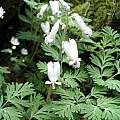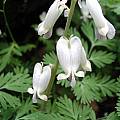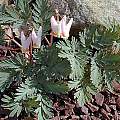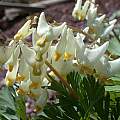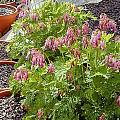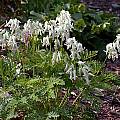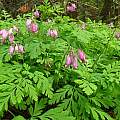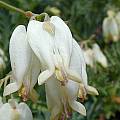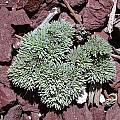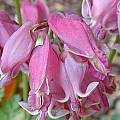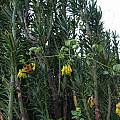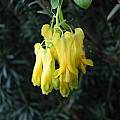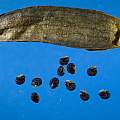Dicentra is a genus belonging to the former Fumariaceae family, which is since APG III included as subfamily Fumarioideae in the Papaveraceae family. Some species have tuberous rootstocks and some have overwintering rhizomes. Others are probably best described as herbaceous perennials. This genus is distributed in North America, Japan and eastern Asia.
Dicentra canadensis is native to the eastern US and Canada. The photos below were taken by Nhu Nguyen in the Great Smoky Mountain National Park in Tennessee, April 2006.
Dicentra cucullaria is another species from Canada and the United States growing from a cluster of small tubers. Flowers are white marked with yellow. Photo by John Lonsdale.
Dicentra eximia This eastern United States species, Fringed Bleeding Heart, grows from a rhizome. It is found on forest floors, rocky woods and ledges in the Appalachian Mountains and is best grown in moist shade. It has fern-like, grayish-green foliage which persists throughout the growing season and pink to purplish red, nodding, heart-shaped flowers. Photos by John Lonsdale of a plant with pink flowers and an unusual white form.
Dicentra formosa is a plant that spreads by rhizomes and has ferny green leaves and rosy pink, occasionally white, heart shaped flowers that arch above the leaves. It is native to the Western North America. It can become invasive in a well watered summer garden. Photo by Richard Haard.
Dicentra formosa ssp. oregana is native to Oregon and California. Photo by John Lonsdale
Dicentra peregrina is an alpine species from Japan and Siberia with large pink or white flowers. This species grows from a rhizome. Photos by John Lonsdale.
Dicentra 'Queen of Hearts' was a selection once offered by White Flower Farms in the early 1980s. Photo from John Lonsdale.
Dicentra scandens is native to the Himalayas. This is an interesting species that climbs along other vegetations in shade to semi-sun areas. It does well in cooler, milder climates and tends to not be very frost tolerant. The photos below were taken by Nhu Nguyen from the Strybing Arboretum, San Francisco. Photograph of seed and seed pod by David Pilling. Confusion between D. scandens, D. macrocapnos and D. thalictrifolia is common. All the climbing species have recently been put in the new genus Dactylicapnos.
